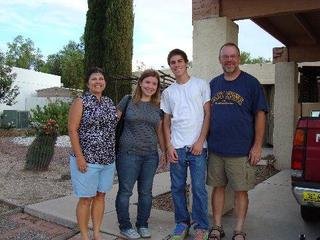http://www.digstation.com/ArtistAlbums.aspx?albumid=ALB000024378
Click this link to purchase and download songs from the Cornerstone CD (or the whole thing!).
Thursday, November 13, 2008
Micah 6.8, part 3
For the past few weeks, we have been considering Micah 6.1-8 in The Refuge. This is an interesting and important passage of Scripture that asks and answers the question:"What does God want from us?". The first two parts of the answer are do justice and love kindness (chesed). The third part is "walk humbly with your God". What does this mean? I think we can state it simply like this: realize that God is God and you are not. To walk humbly with God means to recognize our place and God's place. We are not in control. We are not in control of the world. We are not in control of our lives. And we are certainly not in control of God.
It is easy for us to believe (unconsciously, almost--we would never admit to this) that the world revolves around us. But just as Galileo and Copernicus brought us to understand that the earth is not the center of the universe (or even our galaxy), so we need to come to the paradigm-shifting, earth-shaking understanding that we are not the center of the world. So often we behave and think like God is part of our world. The truth is that this is God's world, and we are only small parts in it.
Another way we need to walk humbly with God is to understand and admit the limitations of our understanding of God. It is our nature to think that we are right, that we understand properly, and that anyone who disagrees with us is wrong. But we need to disagree with us. We need to see that our concepts of God are just that: our concepts of God. God is bigger, and more complex, and more mysterious, and just MORE than we can ever conceive. In his book How (Not) to Speak of God, Peter Rollins describes a position he calls a/theism. This means that we are both theists (believers in God) and atheists (disbelievers in God). We believe in God, but we (at the same time) do not believe our own concepts of God. Another way to say that is we do not limit God to our understanding of God. We will try to explore this a little more Sunday morning.
Here is the worship bulletin.
It is easy for us to believe (unconsciously, almost--we would never admit to this) that the world revolves around us. But just as Galileo and Copernicus brought us to understand that the earth is not the center of the universe (or even our galaxy), so we need to come to the paradigm-shifting, earth-shaking understanding that we are not the center of the world. So often we behave and think like God is part of our world. The truth is that this is God's world, and we are only small parts in it.
Another way we need to walk humbly with God is to understand and admit the limitations of our understanding of God. It is our nature to think that we are right, that we understand properly, and that anyone who disagrees with us is wrong. But we need to disagree with us. We need to see that our concepts of God are just that: our concepts of God. God is bigger, and more complex, and more mysterious, and just MORE than we can ever conceive. In his book How (Not) to Speak of God, Peter Rollins describes a position he calls a/theism. This means that we are both theists (believers in God) and atheists (disbelievers in God). We believe in God, but we (at the same time) do not believe our own concepts of God. Another way to say that is we do not limit God to our understanding of God. We will try to explore this a little more Sunday morning.
Here is the worship bulletin.
Subscribe to:
Comments (Atom)

